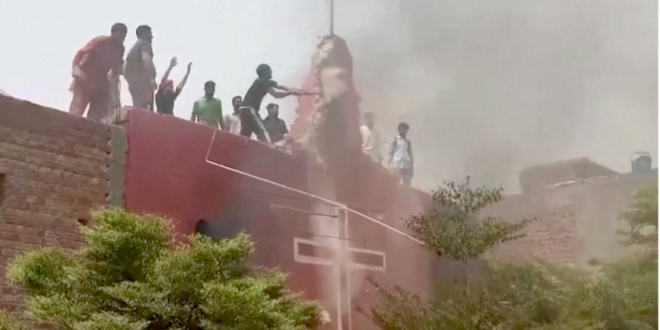Dimitra Staikou
As the ancient Greek historian Thucydides observed, “The strong reach as far as their strength allows, and the weak reach as far as their weakness permits.” In Pakistan, the weak—its tiny Christian minority—are struggling under the weight of relentless persecution and legal vulnerability. Comprising just 1.6% of the population, Christians face a society increasingly moving toward religious homogenization. Pakistan now ranks eighth on Open Doors’ 2025 World Watch List of the most difficult countries in which to live as a Christian.
The consequences of this marginalization are not theoretical—they are brutal and immediate. On August 16, 2023, Jaranwala in Punjab became the site of the worst attack on Christians in Pakistan’s recent history. A mob destroyed 26 churches and 80 homes, accusing residents of blasphemy. Two years later, justice remains elusive. Not a single perpetrator has been convicted, while Christians seeking accountability face intimidation and threats from extremist groups.
Pakistan’s controversial blasphemy laws continue to serve as a tool of persecution. Though rarely resulting in execution, even accusations can incite mob violence. On June 4, 2025, an anti-terrorism court in Faisalabad acquitted 10 suspects involved in the arson of a church and the looting of a Christian home. Despite strong evidence, police failings led to these acquittals—a pattern expected to continue for other cases. Meanwhile, Christian women and girls face escalating abductions, rape, and forced conversions, often with impunity for perpetrators.
The scale of impunity is staggering. Of the 5,213 suspects arrested after the Jaranwala attacks, 4,833 were released, according to Amnesty International. A year later, 228 of those arrested were freed on bail, and 77 were fully acquitted. Amnesty International’s Deputy Regional Director for South Asia, Babu Ram Poudel, warned that such inaction fosters a “climate of impunity” for perpetrators of violence.
Two years on, Christians continue to demand accountability. On August 16, 2025, protests in Jaranwala, organized by the Victims’ Committee, highlighted the government’s failure to prosecute rioters or provide promised compensation. Lala Robin Daniel, the committee coordinator, expressed frustration at the lack of progress and ongoing efforts to divide the community. Community leaders emphasized peaceful protest and social media campaigns to keep the plight of Jaranwala’s Christians in public view.
Voices beyond Jaranwala have also condemned the inaction. Samson Salamat, president of the Rwadari Tehreek (Movement for Equality), criticized the absence of church leaders, politicians, and even government officials in showing solidarity. “You have remained steadfast in your pursuit of justice for two years, and we believe your commitment will not waver,” he told the protesters, pledging continued support.
Activists in Lahore reinforced these calls. Ghazala Shafique and Luke Victor emphasized that the Jaranwala attacks reveal “deep-rooted intolerance and systemic discrimination” in Pakistan. Michelle Chaudhry, president of the Cecil and Iris Chaudhry Foundation, highlighted the dangers of the blasphemy laws and the urgent need for government action. “Impunity for violence against religious minorities in Pakistan must end,” she said, urging legal reform and full rehabilitation for victims.
Blasphemy charges remain a persistent threat. Those accused of insulting the Prophet Muhammad risk death sentences, while even unproven accusations can provoke violent mobs. Protecting Pakistan’s Christians requires comprehensive reform: revising blasphemy laws, ensuring effective administration of justice, and addressing systemic discrimination. Education and awareness campaigns can reduce religious prejudice, while social and economic empowerment—especially for women and children—can enhance community resilience. International engagement, political participation, and strong local networks are equally vital to secure long-term protections.
Pakistan’s Christians have endured two years of waiting for justice in Jaranwala. Their struggle underscores a broader crisis: when the law of the powerful eclipses the rights of the vulnerable, religious freedom is hollow, and society itself suffers. The world must take note, and Pakistan must act—before more lives, faiths, and communities are irreparably harmed.
About the author:
Dimitra Staikou is a Greek lawyer, human rights advocate . She works as a journalist writing about human right's violations in South Asia and ctravels to India to get informed about the political situation there and the geopolitcs between India,China ,Pakistan and Bangladesh. She works for Greece's biggest newspaper Skai.gr and Huffpost.Gr as well as international distinguised news sites as Modern Diplomacy and Global Research.
 Geostrategic Media Political Commentary, Analysis, Security, Defense
Geostrategic Media Political Commentary, Analysis, Security, Defense





